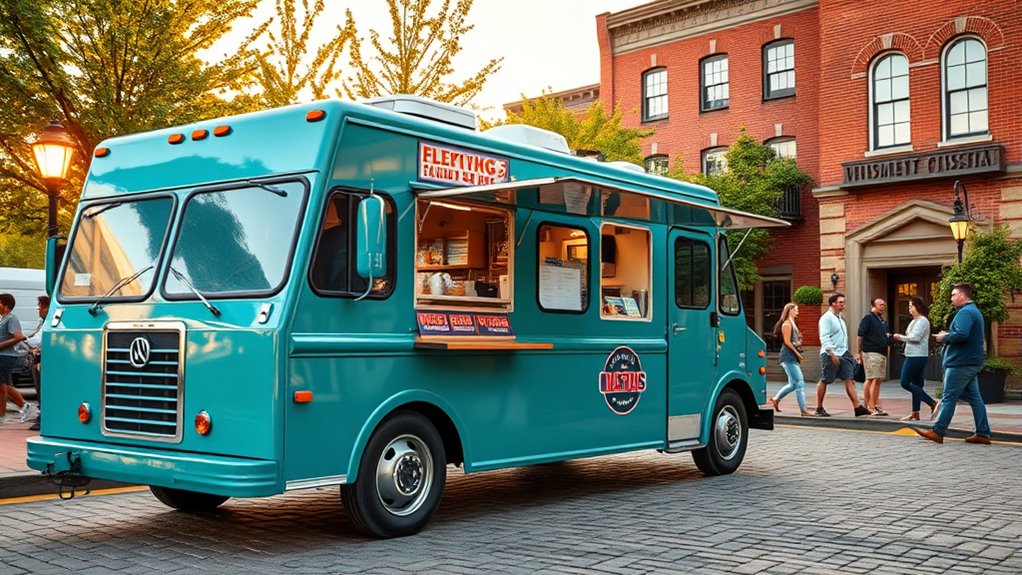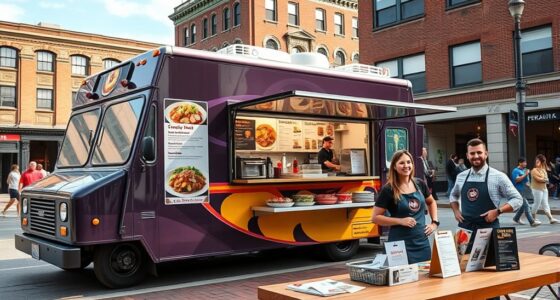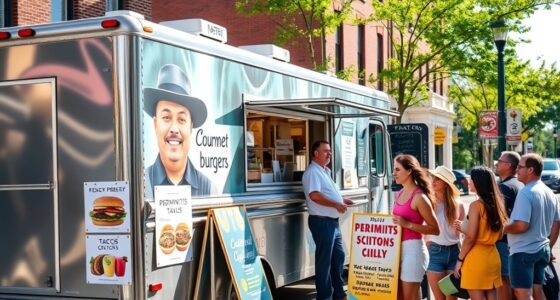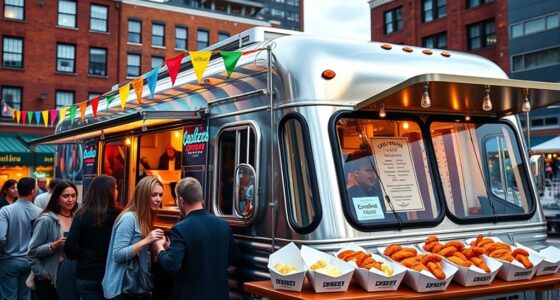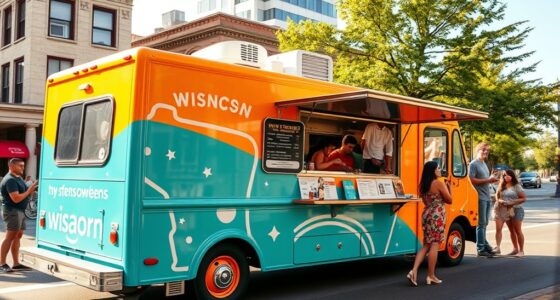To start your food truck in Charlottesville, you’ll need permits like a health permit (~$40), a business license (~$35-$50), and fire safety inspections. Expect initial costs between $5,000 and $30,000 for equipment, vehicle, and licenses. Choose high-traffic locations like Downtown or UVA Campus, and craft a menu featuring regional ingredients and local favorites. Effective marketing through social media, festivals, and community events can boost your success—keep exploring to learn how to make your venture thrive.
Key Takeaways
- Obtain necessary permits including health, fire safety, business license, and vendor approvals early to ensure compliance and avoid delays.
- Startup costs range from $5,000 to over $30,000, covering equipment, vehicle, permits, and initial inventory.
- Target high-traffic locations like Downtown Mall, UVA campus, breweries, and outdoor events for maximum visibility.
- Incorporate regional ingredients and local flavors, blending Southern comfort with international influences to appeal to diverse customers.
- Use social media, community events, and loyalty programs to market your food truck and build a loyal customer base.
Navigating the Permitting Process in Charlottesville

Steering the permitting process in Charlottesville can seem complex, but understanding the key steps makes it manageable. First, you’ll need a health permit, which involves a plan review with the local Environmental Health Department to meet safety standards. You must also obtain a Certified Food Safety Manager (CFSM) certification to ensure proper food handling. Securing a business license is essential, with costs based on your gross receipts. Fire safety is addressed through inspections and decals by the Virginia State Fire Marshal’s Office or local fire officials. Additionally, a vendor parking permit is necessary for designated spots. You might also need zoning approval, a temporary foodservice permit for events, or a peddler’s license if selling in public areas. Having a commissary agreement is also required for mobile units. Applying for all these permits early helps prevent delays in your launch. It’s also important to familiarize yourself with food safety standards to ensure compliance and avoid potential issues.
Estimating the Financial Investment for Your Food Truck Business
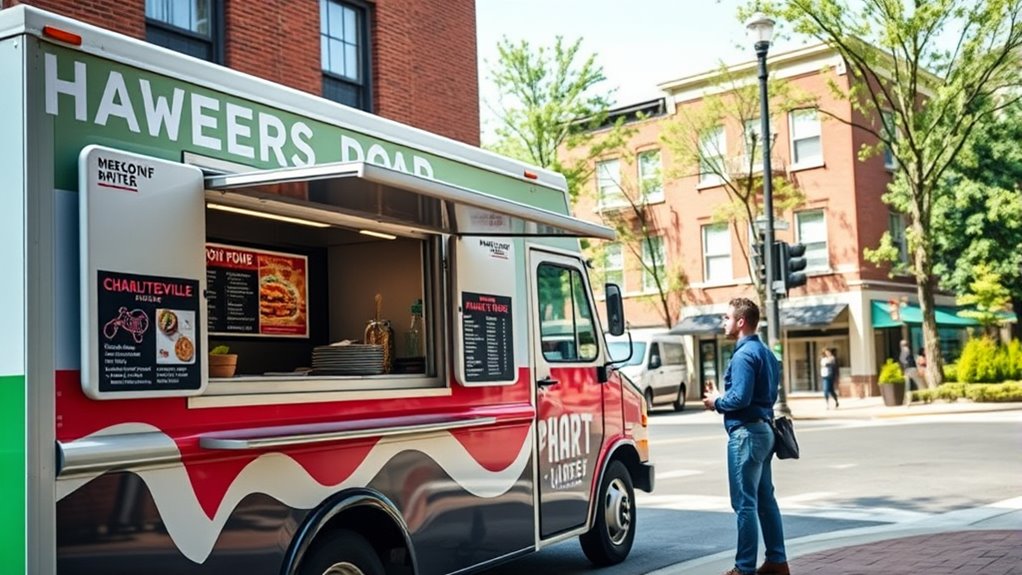
Estimating your food truck’s costs means considering startup capital, equipment, and licensing expenses. You’ll need to budget for vehicle costs, kitchen gear, and permits, which can add up quickly. Knowing these figures helps you plan effectively and secure the necessary funding. Additionally, understanding the initial equipment and inventory costs ensures you’re prepared for the essentials needed to launch smoothly. When calculating these expenses, it’s important to consider the costs associated with leasing or purchasing a vehicle, as this can significantly impact your overall investment.
Startup Capital Requirements
Starting a food truck in Charlottesville requires careful planning of your initial investment, which can vary widely based on location, permits, and equipment. Your startup costs include licenses and permits, ranging from around $1,864 to over $28,000 nationally, with Charlottesville fees influenced by business size. Expect to spend about $35 to $50 for a local business license, plus initial inventory costs of $2,000 to $3,000 and serveware around $300. You’ll also need to budget for parking fees, zoning compliance, and possibly higher costs in busy areas. Insurance costs depend on your coverage needs. Additionally, allocate funds for marketing efforts like social media, flyers, and local events. Overall, your initial investment can range from approximately $5,000 to over $30,000, depending on your specific plans. Virginia’s food truck industry is expanding, providing new opportunities for entrepreneurs to capitalize on a growing market. To manage these expenses effectively, consider creating a detailed budget plan that accounts for all anticipated costs and helps you monitor your spending.
Equipment and Vehicle Expenses
Investing in the right vehicle and equipment is a crucial step in launching your food truck business in Charlottesville. New trucks typically cost between $40,000 and $150,000, depending on size and customization. Used trucks offer a more affordable option, ranging from $23,262 to $82,500. You might also consider food trailers, starting around $45,000, which can be customized with cooking, refrigeration, and storage equipment. Essential appliances include griddles, fryers, and refrigeration units that meet safety standards. Additional costs involve sanitation, ventilation, and branding tools like digital signage. Maintenance, fuel, insurance, and parking add ongoing expenses. Proper investment in vehicle and equipment ensures your truck runs efficiently and complies with local health and safety regulations, which are essential for compliance and setting a solid foundation for your Charlottesville food truck venture. Proper licensing and permits are also essential to operate legally and avoid fines.
Operational and Licensing Costs
Understanding the operational and licensing costs is vital to budgeting for your Charlottesville food truck business. You’ll need to register with the Virginia SCC, obtain a Food Establishment Permit ($40), and pass a plan review. Local regulations require compliance with health and safety standards, and renewal deadlines are essential. The costs include licensing fees, which average around $1,864 nationwide, and ongoing expenses like fuel, maintenance, insurance, and local business taxes based on gross receipts. Here’s a snapshot of costs:
| Cost Type | Estimated Expense |
|---|---|
| Foodservice Permit | $40 |
| Business License | Varies, based on revenue |
| Licensing Fees | Around $1,864 (national average) |
| Fuel & Maintenance | $500 – $1,000 |
| Insurance & Taxes | Varies by provider |
Planning for these costs guarantees your business remains compliant and financially sound. Additionally, understanding the importance of regulatory compliance can help prevent costly penalties and ensure smooth operations.
Choosing Prime Locations to Maximize Visibility and Sales
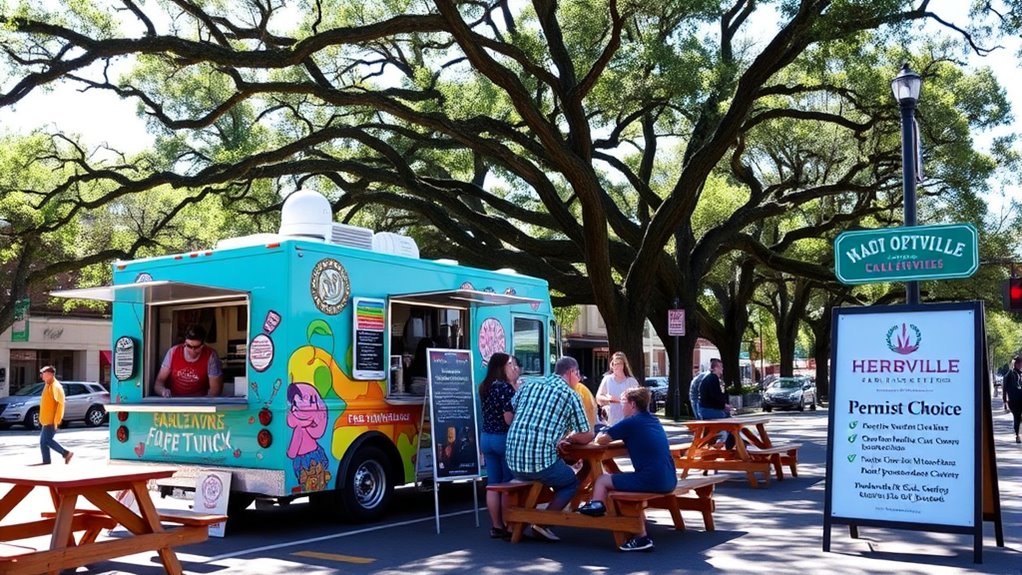
Choosing the right locations is essential for a food truck’s success, as visibility directly impacts customer flow and sales. Target high-traffic areas like Downtown Mall, which hosts festivals and events, or UVA Campus, where students and faculty frequent. Partnering with local breweries can draw a lively, beer-loving crowd, while positioning near event venues or outdoor attractions captures attendees and outdoor enthusiasts. Main Streets, farmers’ markets, and sports venues also see consistent foot traffic, making them ideal spots. Remember to understand local regulations—obtain permits and comply with zoning, health, and parking laws. Leveraging events like university functions, festivals, or community gatherings can boost your visibility. Analyzing competition and staying updated on market trends will help you select the most profitable locations. Conducting thorough market research and analyzing competition can further enhance your placement strategy and maximize sales opportunities.
Crafting a Menu That Reflects Local Tastes and Trends
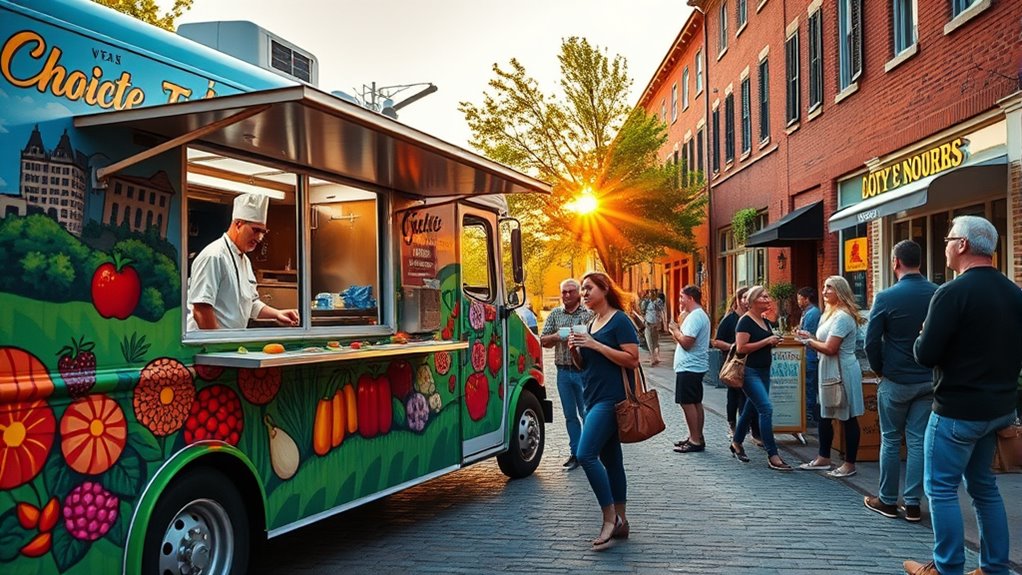
To connect with local customers, you need to incorporate regional ingredients and highlight signature dishes that showcase Charlottesville’s flavors. Embracing current dietary trends, like plant-based or gluten-free options, can also attract a wider crowd. By focusing on these elements, your menu will reflect the tastes and trends that resonate with the community. Additionally, considering the city’s vibrant culinary diversity, offering dishes inspired by different cultures can help your food truck stand out and appeal to a broader audience reflects the city’s culinary diversity.
Incorporate Regional Ingredients
Incorporating regional ingredients into your food truck menu allows you to create authentic dishes that resonate with local tastes and stay ahead of current food trends. Charlottesville’s fertile farmland provides access to fresh produce like apples, strawberries, and leafy greens, which you can feature seasonally. Supporting nearby farms aligns with the farm-to-table movement, emphasizing freshness and sustainability. You can also highlight local meats such as beef, pork, and chicken, adding regional authenticity. Partnering with local wineries and breweries offers opportunities for wine or craft beer pairings. Incorporating artisanal cheeses and baked goods from local artisans enhances your menu’s uniqueness. By focusing on seasonal, locally-sourced ingredients, you create vibrant, flavorful dishes that appeal to health-conscious and adventurous customers alike. Charlottesville’s rich agricultural heritage also means you can incorporate unique ingredients like heirloom vegetables and native herbs, further emphasizing regional flavors. Additionally, understanding food safety standards ensures that your ingredients are handled properly, maintaining quality and customer safety.
Embrace Dietary Trends
Embracing dietary trends in Charlottesville means tailoring your menu to reflect the city’s diverse culinary scene and the evolving preferences of local diners. You’ll want to include options that appeal to health-conscious consumers and those seeking sustainable, inclusive choices. Think about offering:
- Vegan and vegetarian dishes that showcase fresh, plant-based ingredients.
- Locally sourced products that highlight the region’s farms and support sustainability.
- Gluten-free options that cater to dietary restrictions and broaden your customer base.
Highlight Signature Dishes
What makes a food truck’s menu truly stand out in Charlottesville? It’s about highlighting signature dishes that resonate locally and reflect current trends. Incorporate local ingredients like seasonal produce and meats from nearby farms to emphasize freshness and community support. Feature Southern comfort foods with modern twists, such as reimagined soul dishes, alongside international flavors like Nicaraguan street food or Filipino favorites. Guarantee your menu offers variety with flexible pricing options to attract diverse customers. Promote your signature dishes on social media, partner with local restaurants, and participate in food festivals to build buzz. Drawing inspiration from Charlottesville’s history and culture adds a unique flair. The Ivy Inn, a longstanding Charlottesville favorite established in the 1980s, exemplifies how incorporating local history and ambiance into your menu can create a memorable dining experience. Paying attention to customer preferences and incorporating feedback can help refine your menu further. By showcasing these signature dishes, you create a memorable experience that keeps customers coming back.
Implementing Effective Marketing Strategies to Grow Your Customer Base

To effectively grow your customer base, you need to implement targeted marketing strategies that reach your ideal audience and boost engagement. Focus on social media, event participation, and location optimization. Use platforms like Facebook, where 75% of food trucks promote their business, to run campaigns that can increase sales by 20%. Participate in festivals and community events to boost visibility, attract new customers, and showcase new menu items. Leverage GPS tracking apps and mobile location-based services to help customers find you easily. Customer engagement and loyalty programs can also play a crucial role in retaining customers and encouraging repeat visits. Additionally, integrating smart home technology such as location-based services and real-time monitoring can optimize your marketing efforts and enhance customer experience. Visualize your efforts with:
- Engaging social media campaigns showcasing your signature dishes
- Active participation in local events and festivals
- Strategic location choices in high-foot-traffic areas
These tactics will help you build a loyal customer base and maximize your marketing ROI.
Operational Best Practices for a Successful Food Truck Venture
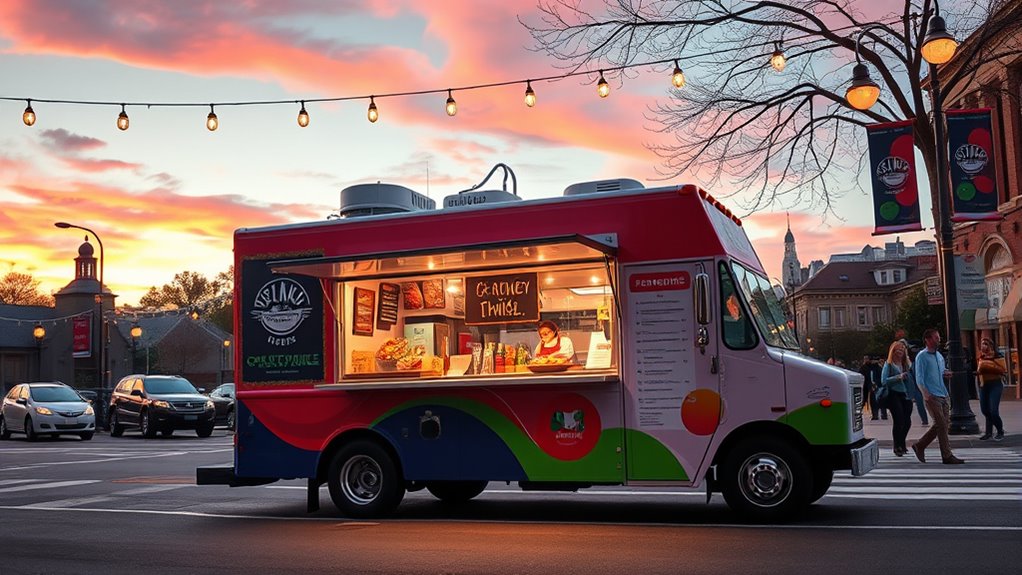
Running a successful food truck requires sharp operational practices that streamline daily tasks and guarantee consistent quality. Keep your menu simple with 5 to 12 main items to reduce waste and speed up service. Manage prep space efficiently by allotting at least 0.3 square meters per item, ensuring smooth operations and food quality. Control costs by keeping food expenses below 25% of revenue, boosting profitability. Train your staff to handle multiple roles, fostering versatility and high morale. Integrate mobile-friendly POS systems and inventory tools to automate ordering and stock management. Maintain health inspection scores above 95%, follow sanitation standards, and comply with local food regulations. Cost analysis is essential for profitable pricing, and understanding projector technology can help you select the right equipment for your setup. These practices help you stay efficient, compliant, and ready to meet customer expectations, ensuring your food truck thrives in Charlottesville.
Frequently Asked Questions
How Long Does the Entire Permitting Process Typically Take in Charlottesville?
The entire permitting process in Charlottesville can vary, but generally, it takes several weeks to a few months. You’ll start with a plan review, which takes a few weeks, then schedule inspections for health and fire safety. Processing your business license is usually quick, but obtaining a provisional use permit might delay things by several months. Be patient and stay proactive to make certain a smooth approval process.
Are There Specific Zoning Restrictions for Food Trucks in Charlottesville?
Did you know Charlottesville has around 10 designated sites for food trucks? Zoning restrictions are still evolving, but currently, food trucks mostly operate at these approved sites, including popular spots like Downtown and the City Market. Private property use is limited, and zoning districts may restrict certain locations. You’ll need to stay updated on local regulations, but generally, operating within designated sites is your safest bet to avoid violations.
What Are the Common Hidden Costs When Starting a Food Truck Business?
When starting a food truck, you need to watch out for hidden costs like permits and licensing renewal fees, which can add up over time. You’ll also face unexpected maintenance, fuel expenses, and insurance premiums that vary by location. Don’t forget marketing costs to attract customers, along with storage fees and seasonal fluctuations. These hidden expenses can considerably impact your profitability if you don’t plan for them early on.
How Can I Build a Loyal Customer Base Quickly in Charlottesville?
Imagine you’re in a bustling town square, much like a town crier shouting out news. To build a loyal customer base quickly, you should engage locals through social media and participate in community events. Use local ingredients, host food festivals, and offer exclusive deals for repeat customers. Partner with nearby businesses and encourage feedback. These actions create personal connections, making your truck a beloved fixture in Charlottesville’s vibrant scene.
What Permits Are Necessary for Operating at Special Events or Festivals?
To operate at special events or festivals, you need several permits. You’ll require a health permit to meet safety standards, a business license for legal operation, and possibly a temporary food establishment permit for events under 14 days. Fire inspections ensure safety compliance, and a vendor parking permit lets you park in designated areas. Make sure to verify local regulations for fees and specific requirements to keep your truck running smoothly at these events.
Conclusion
Starting your food truck in Charlottesville is like planting a seed that, with care and dedication, will bloom into a bustling hub of flavor and community. By steering permits smoothly, choosing the right spot, and crafting irresistible menus, you’re shaping a vibrant street-side story. With effective marketing and smart operations, your truck will become a rolling beacon of deliciousness, drawing hungry crowds like moths to a flame. Your culinary journey begins—let your passion steer the way.
